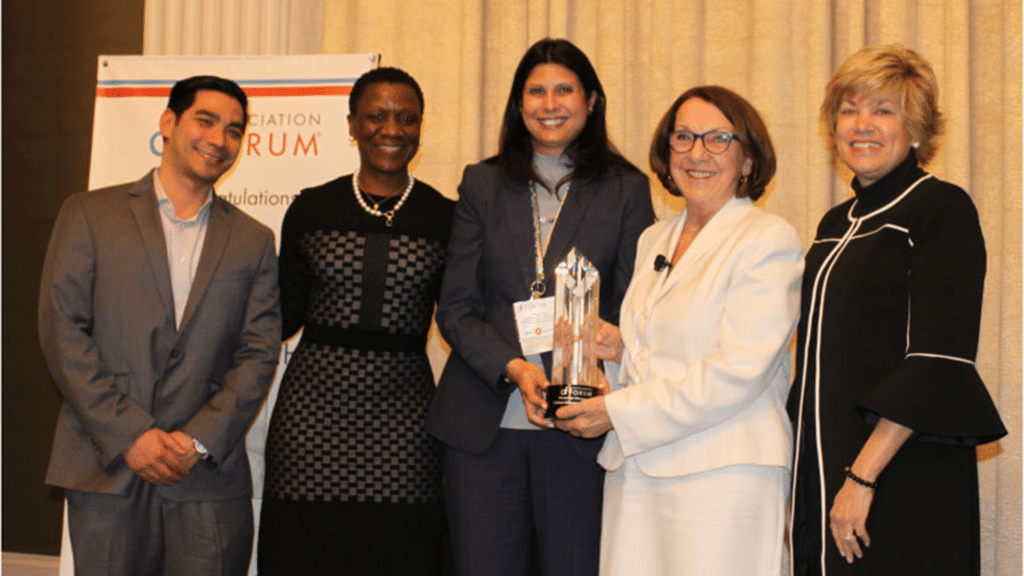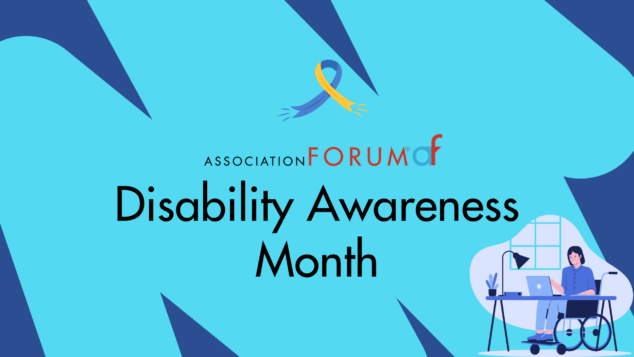Closing the Gaps

The closing keynote at the Women’s Executive Forum was delivered by Dr. Kathleen T. O’Loughlin, executive director of the American Dental Association. Dr. O’Loughlin is the 2019 Woman of Influence award recipient in recognition of her exceptional achievements and contributions to the association management profession and society.
In her presentation, Dr. O’Loughlin spoke about the major gaps that exist between men and women in business and medical professions. “These are the gaps that we need to do something about if we’re intentional,” she said. “Once you acknowledge them, you’re empowered to take action.”
Earnings
Dr. O’Loughlin pointed to findings from the ADA Health Policy Research Institute demonstrating that found for every dollar a male dentist makes, women, on average, earn 65 cents. While 13 cents of this earnings gap is accounted for by factors such as differences in experience levels, specialty, and hours worked, there still remains 22 cents of earnings differences that remain “unexplained.”
The commonly-held thought has been that the wage gap was due to women being less likely to negotiate their salary, but a recent Harvard Business Review study suggested that women ask for raises just as often as men, they just end up getting less. “It could have to do with subliminal bias,” said Dr. O’Loughlin. “It could have to do with the way women negotiate.” She postulated that men are less averse to risk, so may be more willing to ask for more money regardless of any potential consequences to reputation or relationship.
The take-home message, according to Dr. O’Loughlin: “You can close the gap. You can benchmark your salaries. You can make sure that every year you’re looking at compensation and correcting when you start to see gaps that are unexplained.”
The path to closing that gap begins with empowering conversations around salary. As leaders, women can open the conversation during the hiring process by allowing their interviewees to ask the right questions and understand their value.
Leadership
Dr. O’Loughlin discussed the stereotypes and biases that women face in professional settings. She referenced off-hand comments such as referring to a woman as “the girl from finance,” and said that behavior needs to be addressed by standing up to it. “You need to correct it in the moment,” she said. “There is a need to not put up with this language. Be a role model for your female staff and show that it is not okay. I think that’s a really important message to send.”
Additionally, having women in leadership is necessary to be able to understand the needs of ADA’s membership, which is becoming increasingly female. By 2030, half of all dentists will be women, which means that the ADA needs to have leadership that represents and mirrors those demographics. To support the need for more diversity in leadership, the association founded ADA Institute for Diversity in Leadership to facilitate a leadership pipeline for underrepresented groups.
Dr. O’Loughlin urged the leaders in the room to celebrate their employees’ success—even if it takes them away from their organization. “I’m always kind of happy when somebody leaves ADA and ends up in a better job at another association,” she said. “We’ve helped them get there. They will sing your praises for the next 30 years. I’ve met some younger talent and they were afraid to tell their supervisor that they’re interested in a different experience, a broader experience. I want my people to stay, but going on an interview will help sharpen their skills and keep them current. If you get a better job somewhere else, then we played a role in helping you succeed.”
Family Behavior
When it comes to work-life balance, Dr. O’Loughlin made it clear that trying to do it all is a fool’s errand. “Decide where your priorities are,” she said. “You can’t be perfect all day long, so pick the areas where you really need to win and focus your energies there.”
She also advised that women have more a tendency to nurture, support and protect, which are inherently positive qualities, but ones that can result in a leader doing someone else’s job because they’re not doing it correctly. “Do expect people to perform,” she said. “If you’re doing someone else’s job because they’re not doing it correctly, deal with that situation. Confront it immediately. Make a difficult decision and move on.”
There is still room for empathy and kindness while making those difficult decisions and dismissing someone can be the toughest task for even the most seasoned leader. But Dr O’Loughlin reminded the group that over the course of any career, there are going to be bad days—days where you feel overwhelmed both personally and professionally—and that you can become a little better at balancing your life and having hard conversations by being intentional and seeking training and mentorship in those areas.
Tags
Related Articles
Celebrate National Hispanic Heritage Month and Empower Latino Professionals with Self-Advocacy Strategies from Association Latinos
Discover practical strategies for Latino professionals in associations to enhance self-promotion and self-advocacy by overcoming...
Nurturing A Welcoming Environment® for Association Staff
Many associations strive to make all members feel welcome, but what is your organization doing...
Accommodating Disabilities at Work and Events
In this video, association professional and disability advocate Samyuktha Neeraja, MPH, CAE, gives expert advice…




